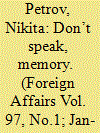|
|
|
Sort Order |
|
|
|
Items / Page
|
|
|
|
|
|
|
| Srl | Item |
| 1 |
ID:
157413


|
|
|
|
|
| Summary/Abstract |
Every spring, buses covered in portraits of Joseph Stalin appear on the streets of Russian cities. His face replaces ads for cell phones, soft drinks, laundry detergent, and cat food. With each passing year, the dictator gets more handsome and more glamorous; a portrait of him in his gorgeous white generalissimo’s jacket has become especially popular. He casts his stern gaze on the citizens, as if to say, “Remember me? I’m here, I didn’t go anywhere—and don’t you forget it!”
|
|
|
|
|
|
|
|
|
|
|
|
|
|
|
|
| 2 |
ID:
071462


|
|
|
|
|
| Publication |
2006.
|
| Summary/Abstract |
Apart from its role in the Moscow show trials during 1936 - 38, the Military Collegium of the USSR Supreme Court under V.V. Ul'rikh also tried some 40,000 'enemies of the people' behind closed doors, sentencing most of them to death. These pseudo-trials of no more than a few minutes took place in prisons or NKVD offices in Moscow or (through the Collegium's assizes) provincial centres. There was no serious investigation of the evidence, and the court turned a blind eye to apparent cases of torture. The judges personally attended executions, occasionally even participating in them. The punishments had been determined beforehand by the political leadership under Stalin by way of lists, with the Military Collegium only 'legalising' the sentences. The defendants originated from the Soviet elite. The aim of this article is to throw more light on this side of the Collegium's activities, mainly based on archival sources. The article suggests that this quasi-legal procedure was adopted by the leadership under Stalin, in preference to purely administrative measures, because it was considered to be less likely to endanger the elite's loyalty. We did not break the law, did not sign just like that. These are lies. Ul'rikh gave reports. There was a court, an indictment, there were sentences: everything as it should be, everything according to the law (Lazar' Kaganovich interviewed by G.A. Kumanev in Kumanev 1999, p. 116).From an organ of justice, [the Military Collegium] was turned into an appendage of the power apparatus, a weapon of arbitrary rule and lawlessness, a terrible machine of mass repressions [Soviet military jurists N. Chistyakov and V. Maslov (1991, p. 76)].
|
|
|
|
|
|
|
|
|
|
|
|
|
|
|
|
|
|
|
|
|